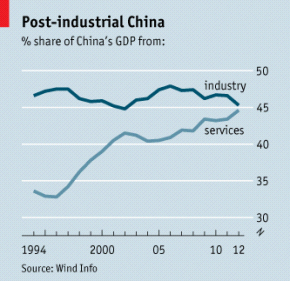“Made in China” has been famous for decades and industry has long made an outsized contribution to China’s output. Now, China is in the middle of trying to transform its economy from an era of super-charged growth fed by manufacturing industry and massive investment to an age of post-industry.
Services are Poised to be the Largest Sector
2013 may mark an interesting turning point. Services are poised to become the country’s biggest sector. According to the national statistics, services (which include transport, wholesaling, retailing, hotels, catering, finance, real estate and scientific research, among other things) accounted for 44.6% of China’s GDP in 2012. That is less than one point behind industry’s 45.3%.
China’s Services Sector may Officially Eclipse Industry
For years, critics have accused China’s policymakers of a factory fetish. Subsidised land, credit, power and a cheap yuan have favored industry. But resourcefulness won’t serve China’s economy in the long run.
Last week, Beijing has outlined plans to shift its economy away from reliance on industry by boosting domestic demand, as Communist Party attempts to introduce reforms meant to rebalance the world’s second largest economy. The surge in services may reflect the ongoing rebalancing of Chinese demand away from exports towards domestic consumption.
Post-industry Outlook
Because services tend to be labor-intensive, their expansion should encourage faster job creation, higher wages and greater house spending.
Excess Demand and Higher Wages
China’s labor markets started the first quarter tight, with the ratio of job opportunities to job applicants at a record high and demand for workers was also on the rise according to a survey conducted by 51Job.
Minimum wages have returned to rapid increases after a pause in 2012 as shown in the data of Beijing, Zhejiang and Guangdong. A survey of factories in the Pearl River Delta found that wages for blue collar workers are set to rise 9.2% in 2013. Anecdotal evidence suggests wages in some areas may be rising even faster. Based on advertisements on 58.com, restaurants in Beijing are offering 3,000 yuan a month for waitresses and still not getting enough applicants.
Greater Consumption
Outgoing premier Wen Jiabao on Tuesday warned of the urgent need to enhance people’s ability to consume at his final National People’s Congress address. According to Wen, consumption would deliver growth of 7.5 percent in 2013. And expanding domestic demand is taken as the long-term strategy for domestic development because consumption was the key to unlocking the full potential of domestic demand in the economy of 1.3 billion people, as well as reducing excess, inefficiency and inequality.
Caveats to be Noted
As China’s post-industrial future is nigh, a number of caveats should be noted. Despite its growth, the role of services in China’s GDP still falls short of global norms. In addition, service prices have also been rising faster than those in industry.
Limitations Against Innovation
The best innovation in the post-industrial world comes from the sharing of knowledge and information across a variety of fields, but China seems to have a political system that mentally at its core is opposed to those networks ever becoming viable. The Internet limitations have also meant that Chinese companies have struggled to expand overseas.
Financial Reform
What happens next depends a lot on how the new leadership acts on the need to reform the financial system, such as the tax system and state-owned enterprises. But there’s also the chance that China’s new leaders will not do anything and the country will hit an “economic wall” – a crisis that will force the government to act.



It’s a very interesting artical. As we all know, service industry has drawn a lot of attention recent years expecially after Premier Li’s press conference speech this week. Many prefessionals and experts have commented on this issue. Rently, Professor Pissarides, Nober price winner, has stated that China’s aging population is quite potential to the development of service industry. So what do you think ?